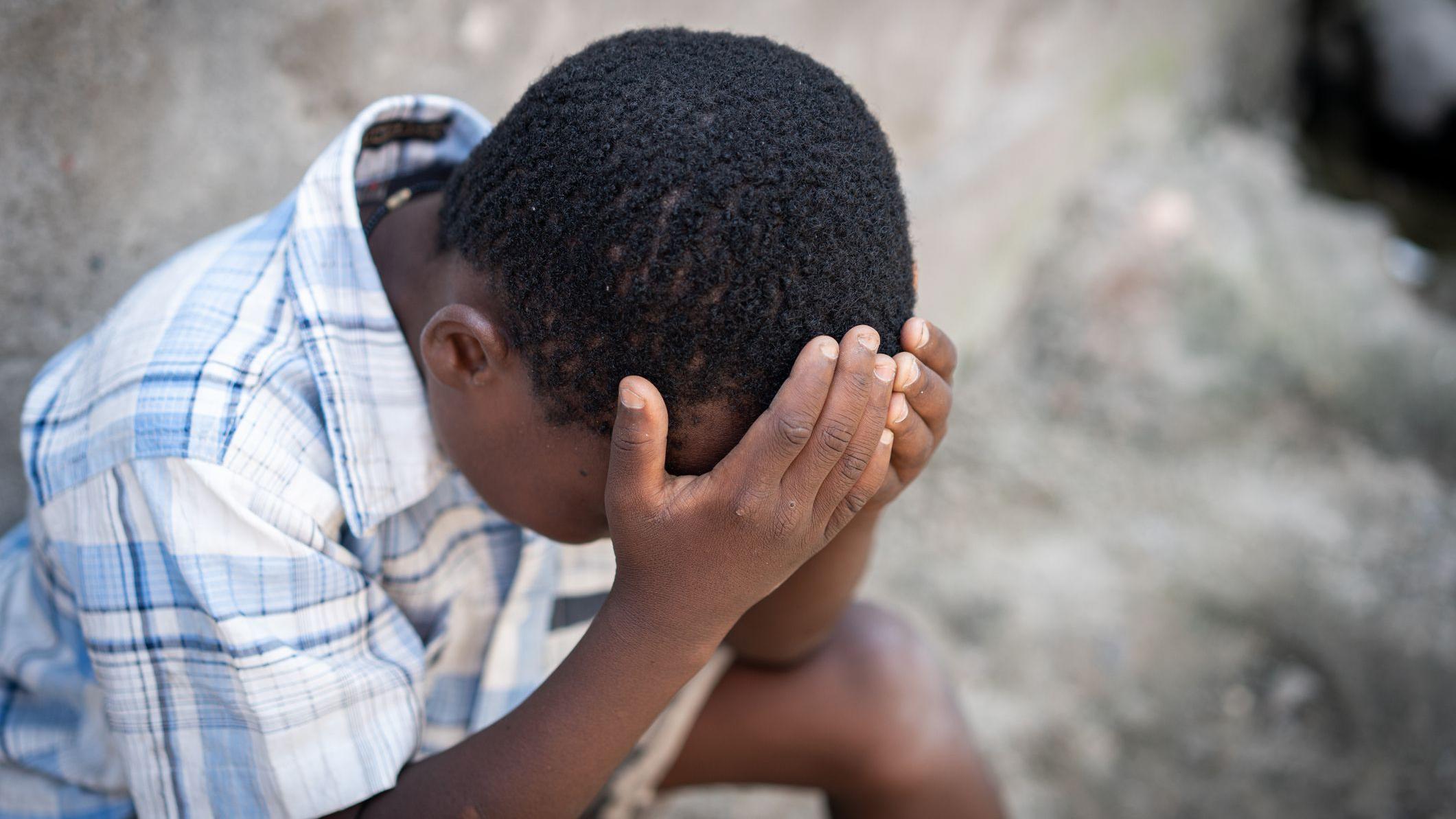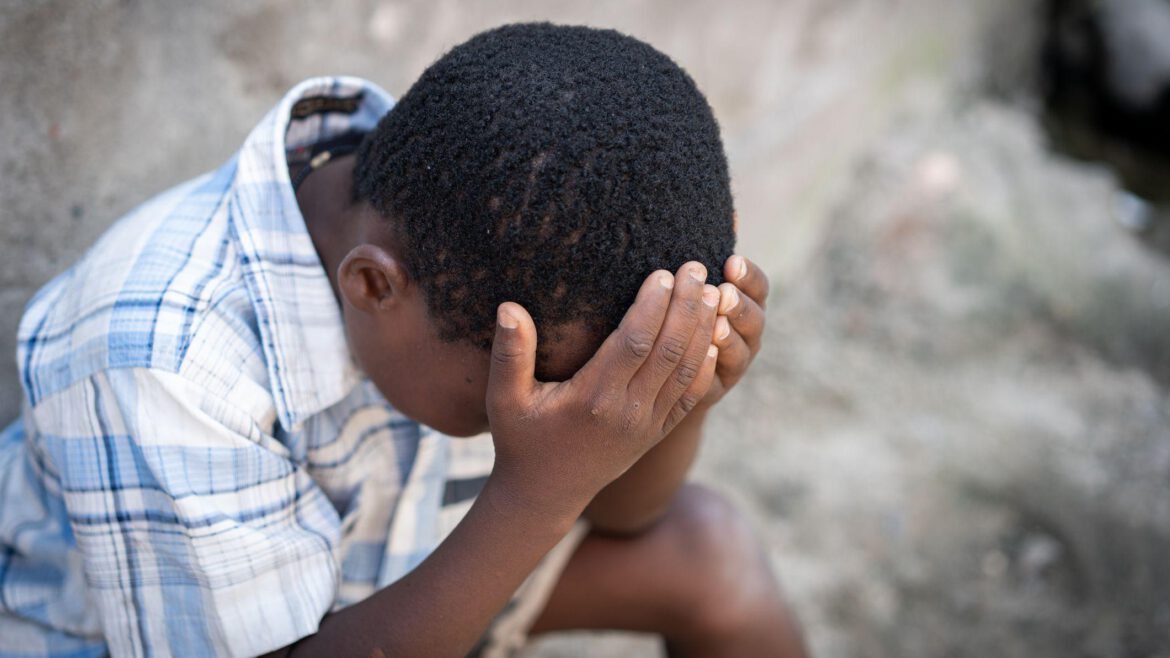
To be male pikin for patriarchal society like Nigeria dey give lie-lie impression say you dey Macho and you gatz hide your fear from public knowledge.
Society dey expect you to man up for evri situation sake of say to show your worry na sign say you weak. You dey too powerful and you no fit cry for open or show emotions. Dis ‘super-human’ expectation dey show for cultures, religion and norms and sometimes as dem dey teach di boy child from small.
In fact, many believe say to be male pikin for Nigeria give you one natural advantage over di girl child, dis na why loud voices dey advocate for di empowerment of di girl child.
But shey we fit don unintentionally arrange di system to di disadvantage of di boy child?
Rise of sexual abuse cases among boys for Nigeria?
Nkechi Ndiaye one radio host for Lagos, Nigeria bin decide to begin advocacy for di rights of di boy child afta years wey she don dey listen to men on her radio programme about dia abusive childhood experiences.
She share di tori of one 14-year old boy wey bin dey sexually abused by im mama.
“Dis boy tok say im mama bin lost im papa (her husband) and eva since di papa die, di mama begin look am differently and go call am to touch her bodi and e reach point wey e dey sexual and di mama begin demand sex from am. As little boy wey im be dat time, e bin wan help im mama to stop di cry and e fall to dat.
“At some point e bin feel say somtin dey wrong somwia and e report to im school principal about am.
- ‘My rapist believe say attacking pesin wit albinism go protect am from sickness’
- ‘Pesin tell me say make I kill my pikin becos e no get hands’
- Five types of food wey children need to grow well
“Wen dem call di mama she tok say “she dey sorry, na di devil, say di boy na di replica of her husband,” Nkechi tok.
Physical and emotional abuse against pikin plenti for Nigeria. Di UNICEF report say five percent increase dey for violence against children between 2016 – 2021 but sabi pipo believe say response to dis statistics no dey directional.
Rape na sexual violation wey mostly dey seen as abuse of di girl child, yet, di 2015 Violence Against Children Report tok say 1 out of 10 boys go experience sexual violence bifor di age of 18.
Taiwo Akinlami – one child advocate bin dey abused as child for Lagos. Im abusive childhood experience make am to start campaign for di protection of di boy child. E say sexual abuse of di boy child often dey unreported by di society.
Taiwo believe say some negative behaviour wey men get na from di social-cultural orientation and abusive experiences of dia childhood.
“Within di school system, 24% of boys dey sexually molested as against 15% of girls,” e tok.
About wetin di society tink about masculinity e recall say “I cry a lot wen I see inspirational tins, bifor now I dey always tink say na problem, sake of say wen I dey grow up dem tell me say men no dey cry, but dat na one of di lies, one of di myths wey dem don tell men, so dem no go dey able to express demselves”.
Di psychological impact
Dr. Maynunah Kadiri, one Lagos-based Psychologist tok say many men don grow up wit untreated emotional scars wey later affect dia mental health.
“Dis don affect so many men for ways wey be say for evri 20 attempted case of suicide wey we see for women, dat one completed case we see am for men,” Dr. Maynunah tok.
Violence against di boy child fit lead to intimacy dysfunction, post-traumatic stress disorder, alcoholism, drug abuse, and underperformance for school and for work, among oda negative behaviours.
Dr. Maymunah dey worry say di societal expectation on di boy child no match di priority e dey enjoy.
“We put plenti weight and responsibilities on one particular gender but we dey equip dat gender enough? No and I go say am veri loud, No.”
Taiwo Akinlami explain say “70% of dose wey dey abuse drugs, children for Nigeria, na boys. National Bureau of statistics now don tell us say wen e come to imprisonment, crime, 90% of dose wey dey prison na men,” Dr. Maymunah tok.
Di boy child and education for Nigeria
Education dey free and e dey compulsory for evri pikin under di Universal Basic Education Act for Nigeria. However, socio-economic reason dey limit many boys to fit get formal education.
One United Nations International Children Emergency Fund (UNICEF) report tok say 7.4 million boys dey disengaged from education for Nigeria.
Di report say for one 2017/2018, e get about 10 million out-of-school children for Nigeria for primary school level. Male students wey represent di majority of dem, account for 62 percent of di total.
For dia leave-no-child-behind global report on boys disengagement from education, e show say while girls get more wahala to fit get education, boys dey at greater risk to repeat grades, failing to progress and complete dia education. Warning dey say dis fit get effect on choices, behaviours, men health, and dia role as citizens and family decisions.
For one interview wit Gist Nigeria, Rownak Khan, UNICEF Deputy Country Representative Programme tok say “E get gender masculinity role wey dem (boys) don dey given from di society and community wia dem dey get into di trap of behaviour wey no allow dem to dey school”
“Dem see mismatch between di curriculum and wetin actually dey available in terms of job for di market as well, so how we go bring back dis two togeda so dat as individual, di boys go understand di value of education” she add.
For di Northern part of Nigeria, dem dey send many boys out of home for early age under di cova of Almajiri system wit di hope say di children go survive if dem beg for alms.
According to one Education Policy analyst, Crystal Ikanih-Musa, “For di south East we see plenti boys dey drop out of school dey enta apprenticeship to work instead of to finish dia course work. For di North we also see plenti boys wey dey recruited by terrorists and wey tell di children and evri one else say formal education bad”.
While campaigns for opportunities and equality for di girl child enjoy global importance, sabi pipo say e dey important to pay equal attention to di wellbeing of di boy child.
For her own view, Adewunmi Alode, wey dey run di Boys and Men of Honour Campaign, tok say “We dey sidon on top time bomb, wen di ladies wey dey well educated, highly successful find demselves wit men wey no get high emotional intelligence or believe or understand di essence of man and dem dey intimidated by di success of woman, we go get violence, we go continue to see intimidation, we go continue to see harassment, we go continue to see unhappy women”
Therefore, to prioritize di boy child na key requirement to realise di United Nations 2030 Agenda for Sustainable Development to leave no one behind.








